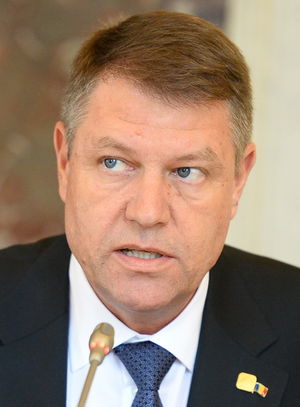Klaus Iohannis
(politician) | |
|---|---|
 | |
| Born | Klaus Werner Johannis 13 June 1959 Sibiu, Romania |
| Alma mater | Babeș-Bolyai University |
| Religion | Lutheran |
| Spouse | Carmen Lăzurcă |
| Member of | Atlantic Council/Distinguished Leadership Awards |
| Party | Democratic Forum of Germans in Romania, National Liberal Party, Independent |
Klaus Werner Iohannis (also spelled Johannis) is a Romanian politician of German heritage who has been the president of Romania since 2014.
Career
He was first elected the mayor of the Romanian town of Sibiu, Transylvania in 2000, on behalf of the Democratic Forum of Germans in Romania (FDGR/DFDR). Although the German (more specifically Transylvanian Saxon) population of the once predominantly German-speaking town of Sibiu had declined to a tiny minority by the early 2000s, he won a surprise victory and was re-elected by landslides in 2004, 2008, and 2012.
In October 2009, four of the five political groups in the Parliament, excluding the Democratic Liberal Party (PDL) of then President Traian Băsescu, proposed him as a candidate for the office of Prime Minister of Romania; however, Băsescu refused to nominate him despite the Parliament's adoption of a declaration supporting his candidacy.[1] He was again the candidate for Prime Minister of the PNL and the Social Democratic Party (PSD) in the elections in the same year.[2] In February 2013, He became a member of the National Liberal Party (PNL), accepting an invitation from then liberal leader Crin Antonescu, and was immediately elected the party's first vice-president, eventually becoming the PNL president during the following year.
Johannis, who is considered a follower of German Chancellor Angela Merkel, was elected Romanian president at the end of 2014. The most important opponent was the then Prime Minister Victor Ponta of the PSD. A year later, Ponta resigned as prime minister after a wave of violent protests. Johannis took advantage of Ponta's resignation to install a "technocrat" government under the "non-partisan" former EU Commissioner Dacian Cioloș.[3] Cioloș had never been part of any political party and had never held elected office.
The new government was dominated by people picked from NGOs financed by George Soros' Open Society Foundations. Johannis also created a Ministry for Public Consultation and Social Dialogue, to coordinated with NGOs.[4]
In 2014, Johannis advocated for tougher sanctions against [[Russia], blaming President Putin for the situation in Ukraine. In an interview before a meeting with Angela Merkel, Johannis called for a stronger NATO presence in Romania and the entire Black Sea region. "Romania does not feel threatened militarily, and we do not expect the conflict to spill over to Romania, but we want to be prepared for all developments. This means that it will need the support of NATO."[5]
Iohannis was re-elected in 2019.[6]
Events Participated in
| Event | Start | End | Location(s) | Description |
|---|---|---|---|---|
| Munich Security Conference/2016 | 12 February 2016 | 14 February 2016 | Germany Munich Bavaria | The 52nd Munich Security Conference |
| Munich Security Conference/2019 | 15 February 2019 | 17 February 2019 | Germany Munich Bavaria | The 55th Munich Security Conference, which included "A Spreading Plague" aimed at "identifying gaps and making recommendations to improve the global system for responding to deliberate, high consequence biological events." |
References
- ↑ https://web.archive.org/web/20120229172637/http://www.euronews.net/2009/10/21/romanian-opposition-demands-new-pm/
- ↑ https://web.archive.org/web/20140110122322/http://www.financiarul.ro/2009/11/30/national-minorities-in-romanias-parliament-support-mircea-geoanas-candidacy-for-runoff-presidential-election/
- ↑ https://www.wsws.org/de/articles/2017/02/04/ruma-f04.html
- ↑ https://jacob-grandstaff.medium.com/george-soross-antidemocratic-influence-on-romanian-politics-34cedad51774
- ↑ https://www.wsws.org/de/articles/2015/03/04/ruma-m04.html
- ↑ https://www.theguardian.com/world/2019/nov/24/romania-centrist-president-re-elected-by-a-landslide-klaus-iohannis